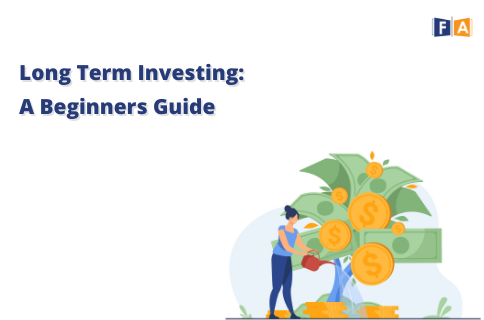
Long Term Investing: A Beginners Guide
Stocks are thought to be the best option for long-term investments. This is partially due to the fact that shares can lose 10% to 20% or more of their value in a short period of time. Investors can achieve a greater long-term return by riding out some of these highs and lows over many years, if not decades.
One of the flaws in investor behaviour is the tendency to be emotional. Many people claim to be long-term investors until the stock market plummets, at which point they withdraw their funds for fear of more losses.
Let’s have a look at how to become a long-term investor who succeeds –
Choose where you wish to put your money
There are several options available like you can invest in stocks on their own or through more passive methods like index funds or mutual funds. Individual stocks can be purchased if and only if you have the time and willingness to conduct regular research and evaluations. We strongly suggest you to do so if this is the case. Over time, it has been demonstrated that knowledgeable and, most importantly, patient investors may outperform the market.
If the intensive quantitative analysis isn’t your cup of tea, there’s nothing wrong with opting for a more passive technique. In addition to buying individual stocks, you can invest in index funds that track a stock index such as the NIFTY50. As a general rule of thumb, investors prefer actively managed funds (Mutual Funds) over passively managed funds (ETFs). Index funds have two advantages: lower costs in terms of lower fees and they virtually always mirror the Long Term Performance of their underlying indexes. Over time, the S&P500 for example has generated total returns of roughly 10% each year, and such success can build enormous wealth.
Robo-advisors: Last but not least, Robo-advisors have been increasingly popular in recent years. A Robo-advisor is a type of stockbroker who invests your money on your behalf in an index fund portfolio that is tailored to your age, risk tolerance, and goals. Not only can a Robo-advisor help you choose assets, but many of them can also help you maximise your tax efficiency and make changes automatically over time.
Decide how much money you want to put into it
The easiest method to answer this question is by elimination, which means figuring out how much money you shouldn’t invest in stocks. As a general rule, don’t put money away that you could need in the next five years. While the Stock Market is almost certainly going to rise in the long run, there is simply too much volatility in stock prices in the short term – a 20% drop in a single year is not uncommon. The stock market dropped by more than 40% during the COVID-19 epidemic in 2020, before returning to an all-time high in a matter of months.
Ensure that your investment portfolio is well-diversified
Never forget the golden rules of investing. Invest only in companies with which you are familiar. Avoid high-volatility stocks until you’ve mastered the art of investing. Penny stocks should be avoided at all costs. Learn how to evaluate stocks using fundamental principles and measures.
Understanding the concept of diversification, which indicates that your portfolio should include a variety of different types of companies, is a smart idea.
Over-diversification, on the other hand, is something to be warned against. Stick to industries you’re familiar with, and if you discover you’re good at (or comfortable with) valuing a specific sort of stock, there’s nothing wrong with that segment of your portfolio accounting for a significant portion of your portfolio.
While buying in-demand and high-growth stocks may appear to be a great (and easy!) way to make money (and it may be for some), it’s best to wait until you’ve gained some experience before doing so. Building a firm foundation (via well-established companies) is, like everything else in life, the winning strategy.
If you want to invest in individual stocks, you’ll need to understand how to assess them using some of the most basic techniques. Learning about value investing is a fantastic place to start. If you want to add some intriguing long-term growth prospects to your portfolio, this is the way to go.
Continue to invest
The Oracle of Omaha, Warren Buffett, explains one of the most significant investment secrets. (It’s worth noting that Warren Buffett is not only the world’s most successful Long Term Investor but also one of the top investing advisors.)
The most certain way to make money in the stock market is to buy shares of great companies at low prices and hold them for as long as the companies stay great (or until you need the money). If you do this, you’ll experience some volatility along the road, but you’ll finish up with amazing investment returns in the long run.





